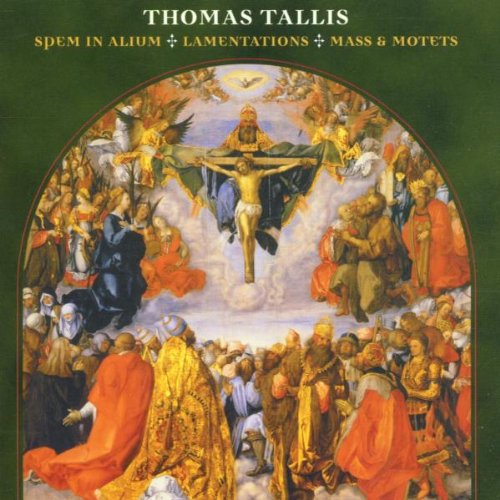Tallis Spem in alium. Lamentations. Mass. Motets
An outstanding performance of Thomas Tallis’s Spem in alium provides a powerful cornerstone for a superbly conceived and executed programme
View record and artist detailsRecord and Artist Details
Composer or Director: Thomas Tallis
Genre:
Vocal
Label: Linn
Magazine Review Date: 10/2000
Media Format: CD or Download
Media Runtime: 67
Mastering:
DDD
Catalogue Number: CKD075

Tracks:
| Composition | Artist Credit |
|---|---|
| Te lucis ante terminum I |
Thomas Tallis, Composer
Magnificat Choir Philip Cave, Conductor Thomas Tallis, Composer |
| Spem in alium |
Thomas Tallis, Composer
Magnificat Choir Philip Cave, Conductor Thomas Tallis, Composer |
| In jejunio et fletu |
Thomas Tallis, Composer
Magnificat Choir Philip Cave, Conductor Thomas Tallis, Composer |
| O salutaris hostia |
Thomas Tallis, Composer
Magnificat Choir Philip Cave, Conductor Thomas Tallis, Composer |
| Lamentations of Jeremiah |
Thomas Tallis, Composer
Magnificat Choir Philip Cave, Conductor Thomas Tallis, Composer |
| Mass for four voices |
Thomas Tallis, Composer
Magnificat Choir Philip Cave, Conductor Thomas Tallis, Composer |
| Salvator mundi, salva nos I |
Thomas Tallis, Composer
Magnificat Choir Philip Cave, Conductor Thomas Tallis, Composer |
| Miserere nostri |
Thomas Tallis, Composer
Magnificat Choir Philip Cave, Conductor Thomas Tallis, Composer |
Author: mberry
This is quite the best performance of Tallis’s 40-part Spem in alium that I have heard. Sung by a constellation of singers, many of them familiar names from other well-established choral groups, it is a gripping realisation. The effect of the slowly moving harmonies is enhanced by a well-conceived and very positive use of dynamics. Precise entries, gently undulating rhythms that are wonderfully supple, and then those firm antiphonal phrases – one group of choirs answered by another at ‘Creator coeli et terra’ – raise the tension, until we twice almost miss a heart-beat at the well-placed rest before ‘Respice …’. Philip Cave’s note on Tallis’s recusancy background, his coded use of numbers and his acquaintance with influential members of the Catholic nobility (in particular the Duke of Norfolk, soon to be executed), gives the listener valuable insights into the whole corpus of Tallis’s Latin compositions, particularly those of a penitential nature like the Lamentations or the Lenten responsory In jejunio et fletu, and further heightens their poignancy.
That great motet, so central to the whole programme, is well supported by the four-part Mass and the delightful group of other pieces for various combinations of voices. The hymn Te lucis with its alternating chant strophes sounding so very English (I don’t want to say precious, but almost too perfect for what was, after all, just run-of-the-mill everyday chant!) has the tempo relationship of the chant to the polyphony just right, which is a tremendous plus, rarely achieved.'
That great motet, so central to the whole programme, is well supported by the four-part Mass and the delightful group of other pieces for various combinations of voices. The hymn Te lucis with its alternating chant strophes sounding so very English (I don’t want to say precious, but almost too perfect for what was, after all, just run-of-the-mill everyday chant!) has the tempo relationship of the chant to the polyphony just right, which is a tremendous plus, rarely achieved.'
Discover the world's largest classical music catalogue with Presto Music.

Gramophone Digital Club
- Digital Edition
- Digital Archive
- Reviews Database
- Full website access
From £8.75 / month
Subscribe
Gramophone Full Club
- Print Edition
- Digital Edition
- Digital Archive
- Reviews Database
- Full website access
From £11.00 / month
Subscribe
If you are a library, university or other organisation that would be interested in an institutional subscription to Gramophone please click here for further information.




